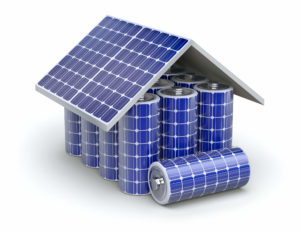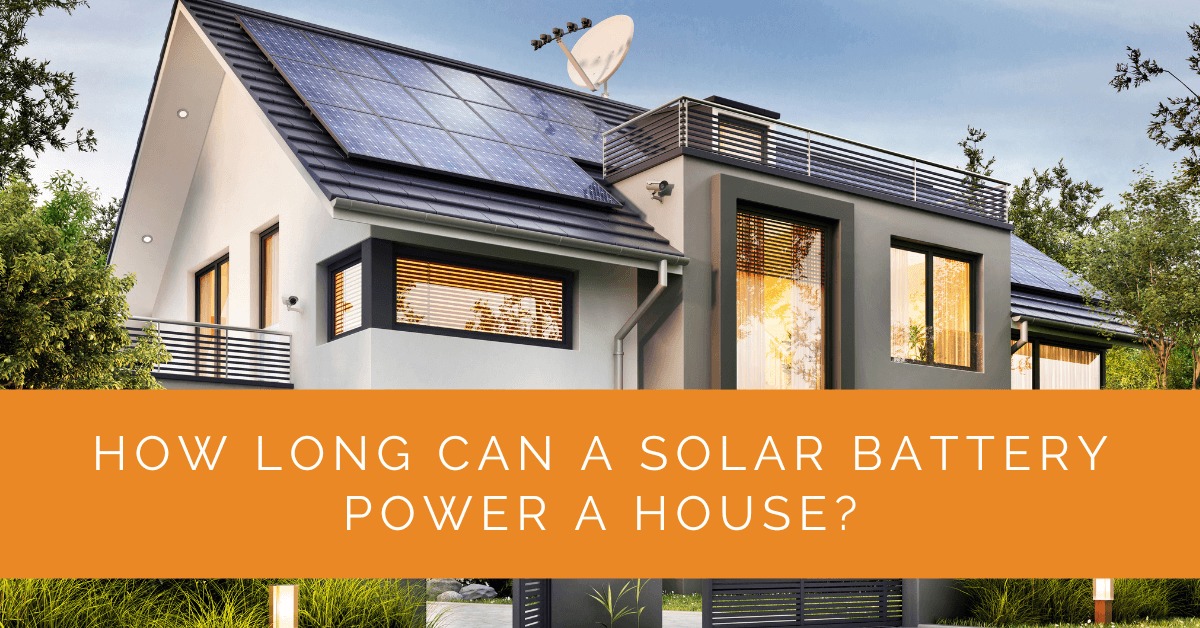As the demand for sustainable energy solutions grows, solar panels and battery storage systems have become increasingly popular. One crucial question that homeowners often ask is, “How long can a solar battery power a house?” This article aims to understand solar batteries’ capacity to power homes, particularly during power outages. By exploring the factors that influence the duration and optimizing battery performance, we’ll shed light on the potential of solar battery systems to keep your home running smoothly, even when the grid goes down.
Contents
- 1 Key Takeaways
- 2 Understanding Solar Batteries and Their Role in Powering Your Home
- 3 Calculating Power Duration
- 4 Factors That Impact How Long a Solar Battery Can Power a House
- 5 Battery Backup and Powering Your Home During an Outage
- 6 Maximizing Solar Battery Performance and Extending Power Duration
- 7 Case Study: Maximizing Solar Battery Performance for Residential Use
- 8 Expert Insights From Our Solar Panel Installers About How Long Can a Solar Battery Power a House
- 9 Experience Solar Excellence with Us!
- 10 Conclusion
Key Takeaways
- The duration a solar battery can power a house depends on factors such as battery capacity and power consumption rate. It can be estimated using the equation: Power Duration (in hours) = Battery Capacity (in kilowatt-hours) / Power Consumption Rate (in kilowatts).
- Solar battery systems offer backup power during outages, allowing homeowners to maintain essential services and appliances for a calculated duration based on their battery capacity and power consumption rate.
- To get a more accurate estimate, consider additional factors such as weather conditions, energy usage patterns, and the availability of sunlight for recharging the battery. Consulting with a solar professional can help determine the optimal system size and provide a more precise assessment of the power duration for your specific setup.
Understanding Solar Batteries and Their Role in Powering Your Home
Solar batteries play a vital role in a solar panel system by storing the excess energy generated during daylight hours when sunlight is limited or unavailable. Unlike traditional solar systems, which rely solely on solar panels to produce electricity in real-time, solar batteries offer the advantage of storing surplus energy for later use. This energy storage capability allows homeowners to power their homes with solar energy during evenings, cloudy days, and even during power outages.
Calculating Power Duration
We can use a simple equation considering the battery capacity and power consumption rate to estimate how long a solar battery can power a house. The equation is as follows:
Power Duration (in hours) = Battery Capacity (in kilowatt-hours) / Power Consumption Rate (in kilowatts)
Let’s consider an example to understand how this equation works. Suppose you have a solar battery with a capacity of 10 kilowatt-hours (kWh) and your home’s average power consumption rate is 2 kilowatts (kW). Plugging these values into the equation, we get:
Power Duration = 10 kWh / 2 kW = 5 hours
In this scenario, the solar battery can power your home for approximately 5 hours before it depletes its stored energy. It’s important to note that this calculation estimates average power consumption and battery capacity. Actual power duration may vary depending on factors such as weather conditions, energy usage patterns, and the efficiency of your solar system.
Remember to consider other factors like the availability of sunlight for recharging the battery and any backup power sources during extended periods of low sunlight. Additionally, it’s crucial to consult with a solar professional who can assess your specific energy needs and system specifications to provide a more accurate estimate of the power duration for your particular setup.
Using the power duration equation as a starting point and considering the unique factors influencing your solar battery system, you can gain insights into how long the battery will power your house and make informed decisions about system design and energy management.

Factors That Impact How Long a Solar Battery Can Power a House
Several factors can significantly influence the time a solar battery can power a house. By understanding these factors and their impact on battery performance, homeowners can make informed decisions when designing and utilizing their solar battery systems. Let’s delve deeper into the key factors:
Battery Capacity
The storage capacity of a solar battery, measured in kilowatt-hours (kWh), plays a vital role in determining how long it can power a house. A higher capacity battery can store more energy, allowing for an extended power duration. It’s essential to assess your household’s energy needs and select a battery with an appropriate capacity to meet them.
Power Consumption
The amount of power your home consumes directly affects the duration of solar battery power. Higher power consumption depletes the battery more quickly. By adopting energy-efficient practices and using energy-efficient appliances, you can minimize power consumption, ensuring that the stored energy lasts longer during periods of limited solar generation.
Energy Usage Patterns
The timing and intensity of your energy usage patterns significantly impact how long a solar battery can power your house. Understanding your energy consumption habits can help you optimize energy usage. For example, scheduling high-energy activities, such as running the dishwasher or doing laundry, during daylight hours when solar production is high can help maximize solar energy and preserve battery power for nighttime or cloudy periods.
Solar Panel System Size
The size of your solar panel system influences how much energy it can generate and, consequently, how much energy is available to charge the battery. A larger solar panel system can generate more electricity, enabling faster and more efficient battery charging. By maximizing the size of your solar panel system, you can enhance the overall performance of your solar battery system and prolong its power duration.
Sunlight Availability
The sunlight on your solar panels directly impacts the battery’s charging capacity. Areas with ample sunlight throughout the year can fully charge the battery more frequently, whereas regions with less sunlight may experience slower charging rates. It’s crucial to consider your location’s climate and position your solar panels for maximum sunlight exposure to optimize battery charging and power duration.
By carefully considering these factors and tailoring your solar battery system to your specific energy needs, you can maximize the power duration of your solar battery and ensure a reliable and sustainable energy supply for your home.
Battery Backup and Powering Your Home During an Outage
One of the significant advantages of a solar battery system is its ability to provide backup power during grid outages. Traditional grid-tied solar systems without battery storage cannot supply electricity during power outages, leaving homeowners in the dark. However, with a solar battery backup system, you can continue to power your essential appliances and maintain comfort and convenience in your home, even when the grid fails.
During a power outage, the battery seamlessly kicks in, supplying stored energy to power critical loads such as lighting, refrigeration, communication devices, and medical equipment. This capability provides peace of mind during severe weather events or unforeseen emergencies.
Solar battery backup systems also offer independence from the electrical grid, allowing you to generate and store electricity. This reduces reliance on utility companies and safeguards against rising electricity costs. Additionally, excess solar energy generated during the day can be stored in the battery during peak evening hours when electricity rates are typically higher, further optimizing cost savings.

Maximizing Solar Battery Performance and Extending Power Duration
To maximize the performance of your solar battery system and extend its power duration, it’s crucial to adopt efficient energy management practices. Here are some strategies to help you optimize your solar battery’s performance and prolong its power duration:
System Sizing
Ensure your solar panel system and battery capacity are appropriately sized to meet your energy needs. A professional solar installer can assess your household’s energy consumption patterns and recommend the optimal system size and battery capacity. By matching your system size to your energy requirements, you can maximize the efficiency and longevity of your solar battery.
Efficient Energy Usage
Implement energy-efficient practices throughout your home to reduce overall energy consumption. Replace old appliances with energy-efficient models, utilize natural lighting whenever possible, and practice energy-saving habits such as turning off lights when not in use and utilizing power-saving modes on electronic devices. By minimizing energy wastage, you can stretch the duration of your solar battery’s power supply.
Load Management
Managing your energy usage effectively can help optimize your solar battery’s performance. Distribute your energy consumption throughout the day, avoiding concentrated high-energy activities when solar production is limited. By spreading out the usage of power-intensive devices, you can ensure a more balanced energy flow, allowing your solar panels to recharge your battery more efficiently.
Regular Maintenance
Regularly maintaining your solar panel system and battery is essential for optimal performance. Keep your solar panels clean and debris-free, as any shading or dirt can reduce energy production. Regularly check the battery system for any signs of malfunction or degradation and schedule routine maintenance checks with a professional. By keeping your system in top condition, you can ensure optimal efficiency and maximum power duration.
Smart Energy Monitoring
Consider installing a smart energy monitoring system that tracks your energy production, consumption, and battery status in real time. These monitoring systems provide valuable insights into your energy usage patterns, allowing you to make informed decisions about your energy management. By staying informed about your energy flows, you can adjust your usage and optimize your solar battery’s performance.
By implementing these strategies, you can maximize the performance of your solar battery system and extend its power duration. With careful planning, efficient energy management, and regular maintenance, you can harness the full potential of your solar battery system and enjoy a reliable and sustainable power supply for your home.
Case Study: Maximizing Solar Battery Performance for Residential Use
Background
At Solar Panels Network USA, we are dedicated to providing homeowners with reliable and efficient solar energy solutions. This case study explores how optimizing a solar battery system can extend its power duration and ensure a stable energy supply during power outages.
Project Overview
Our client, a homeowner interested in sustainable energy solutions, wanted to understand how long their solar battery could power their house during outages. The goal was to optimize their solar battery system for maximum performance and reliability.
Implementation
- Initial Assessment: We began by evaluating the client’s energy consumption patterns and the capacity of their existing solar battery. The client had a 10 kWh battery and an average power consumption rate of 2 kW.
- Calculating Power Duration: Using the power duration equation, we estimated that the battery could power the house for approximately 5 hours (10 kWh / 2 kW = 5 hours). However, this was an average estimate, and actual performance could vary based on several factors.
- Optimizing Panel Position and Cleaning: We assessed the positioning of the solar panels and found that some were partially shaded. We recommended trimming nearby branches to maximize sunlight exposure. We also cleaned the panels to ensure they were free from dust and debris, which could hinder their efficiency.
- Battery Maintenance and Replacement: Upon inspecting the battery, we noticed it had degraded slightly. We recommended replacing it with a high-quality, winter-rated rechargeable battery designed for solar systems to ensure optimal performance in various weather conditions.
- Energy Usage Optimization: We advised the client on energy-efficient practices, such as using energy-intensive appliances during daylight hours when the solar panels were actively generating electricity. This included scheduling activities like laundry and dishwashing during peak sunlight hours.
- Smart Energy Monitoring: We installed a smart energy monitoring system to track energy production, consumption, and battery status in real-time. This system provided valuable insights into the client’s energy usage patterns, allowing for informed decisions on energy management.
- Regular Maintenance Plan: We set up a regular maintenance plan to ensure the solar panels and battery system remained in top condition. This included periodic cleaning of the panels, checking battery connections, and monitoring the system’s overall performance.
Results
Following the implementation of these strategies, the solar battery system showed significant improvement in performance and reliability.
- Extended Power Duration: The optimized system provided more consistent power during outages, extending the duration the battery could power the home. The improved efficiency of the solar panels and battery ensured that the system could maintain essential services for longer periods.
- Enhanced Client Satisfaction: The client was pleased with the increased reliability of their solar battery system. They appreciated the practical advice and ongoing support, which gave them confidence in their investment in solar technology.
Summary
This case study highlights the importance of optimizing solar battery systems for residential use. By considering factors such as battery capacity, energy consumption, panel positioning, and regular maintenance, homeowners can maximize the efficiency and power duration of their solar battery systems. At Solar Panels Network USA, we are committed to helping our clients harness the full potential of solar energy through expert advice and tailored solutions.
Expert Insights From Our Solar Panel Installers About How Long Can a Solar Battery Power a House
The duration a solar battery can power a house depends heavily on the battery’s capacity and your home’s energy consumption rate. For instance, a 10 kWh battery powering a home with a 2 kW consumption rate will last approximately 5 hours.
Senior Solar Technician
Regular maintenance and efficient energy management are key to maximizing your solar battery’s performance. Ensuring your solar panels are clean and free from obstructions can significantly improve the charging efficiency.
Lead Installer
Understanding your energy usage patterns and scheduling high-energy activities during daylight hours can help optimize your solar battery’s efficiency and prolong its power duration.
Solar Energy Consultant
Experience Solar Excellence with Us!
Trust in Solar Panels Network USA, where our seasoned experts deliver top-quality solar solutions for homes and businesses nationwide. With a legacy of countless successful installations and a commitment to sustainable energy, we’re your reliable partner in the solar journey. Ready for a brighter, eco-friendly future? Call us now at (855) 427-0058 and harness the power of the sun!
Conclusion
Understanding how long a solar battery can power a house is crucial for homeowners seeking to embrace the benefits of solar energy and achieve energy independence. By considering the factors that impact a solar battery’s power duration and implementing strategies to optimize its performance, you can fully leverage the potential of your solar panel system and battery storage.
Solar batteries provide backup power during outages and offer the flexibility to store and utilize solar energy according to your needs. With careful system sizing, efficient energy usage, load management, regular maintenance, and smart energy monitoring, you can extend your solar battery’s power duration and enhance your home’s resilience and self-sufficiency.
So, make the most of your solar investment, power your home with clean energy, and embrace the reliability and sustainability of a solar battery system. Take the first step towards a brighter and greener future by exploring the best solar battery options and consulting with professionals who can assist you in designing a system tailored to your specific needs.
About the Author
Solar Panels Network USA stands at the forefront of solar energy solutions, driven by a team of seasoned solar engineers and energy consultants. With over decades of experience in delivering high-quality solar installations and maintenance, we are committed to promoting sustainable energy through customer-centric, tailored solutions. Our articles reflect this commitment, crafted collaboratively by experts to provide accurate, up-to-date insights into solar technology, ensuring our readers are well-informed and empowered in their solar energy decisions.

